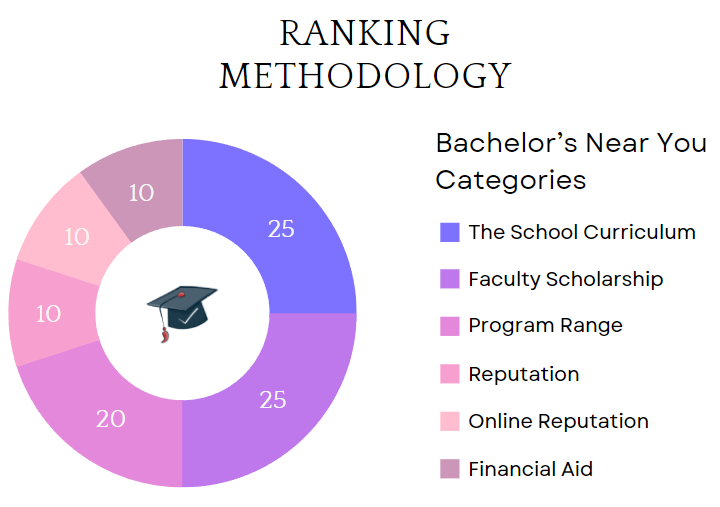The main goal of our website is to help you find the best bachelor’s degree in a high-ranking school near you.
To offer such a service, we must use an advanced ranking methodology for various schools and their programs.
Ranking and evaluating schools is a bit complicated because they have varying characteristics.
Therefore, we follow a specific ranking list that comprises five key categories which contribute a certain percentage.
Here is an overview of the metrics and features we look for when ranking the best bachelor degrees near you.

1. The School Curriculum (Weighs 25%)
- The first thing we evaluate are the leading schools depending on the degree programs.
- We compare the curriculum provided with the knowledge of renowned employers within that discipline.
- We consider the experience and expertise of the faculty in that degree program.
- Our platform weighs heavily on the elective ranges in that discipline.
- We also check out the available specializations within a bachelor’s program.
- We assess the online learning environment if there is any.
2. Faculty Scholarship (Weighs 25%)
- We start by examining the educational background and history of all faculty members.
- We then zero in on their experience both in and out of academia.
- We also look into the faculty leadership and availability of reputable associations.
- Outside the institution’s framework, we look for articles and publications made by members of the faculty.
- We wrap up this subcategory by inquiring about prizes that faculty members may have been awarded by recognized organizations.
3. Program Range (Weighs 20%)
- This weighs in mainly on the range of degree programs available, which entails; bachelors, associates, doctoral, masters, and professional.
- Still, on program range, we assess the available disciplines offered, which include arts, legal, education, technology, communications, and sciences.
4. Reputation (Weighs 10%)
A good reputation dictates a school’s ability to produce qualified scholars.
To assess the reputation of various institutions, we evaluate the following:
- The perception of the curriculum and faculty.
- The freshness of the institution’s academic knowledge.
- How suitable the graduates of that school are in various workplaces.
- How the graduates adapt to different employment sectors.
5. Online Reputation (Weighs 10%)
To confirm a school’s reputation, Bachelorsnearyou.com looks for reviews and testimonials on various online platforms such as:
- Yelp
- Trustpilot
- Great Schools
6. Financial Aid (Weighs 10%)
- The school must be supported by the United States Educational Department and included in the federal register. This assures us that the institution can receive federal financial aid for interested students.
- We also check if the school accepts various financial aid in the form of sponsorships, scholarships, and grants.
Is there a part of our ranking methodology that seems unclear?
You can always reach out to us for further clarification.









